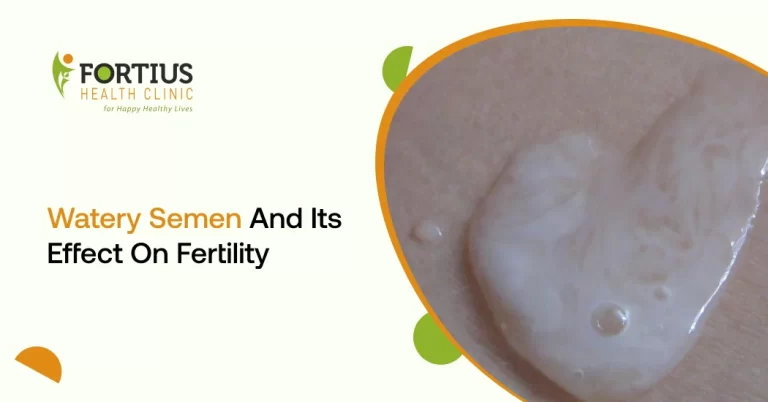
Watery Semen and Its Effect on Fertility
Most men stress about watery and thin semen. Sometimes, watery semen may occur due to frequent ejaculation, lifestyle factors, and nutritional deficiencies. But in some cases, watery semen occurs due to low sperm count, which might have a huge impact on fertility. You cannot just look at your semen and say you have a problem. So, continue reading to learn more about what’s going on with your seminal fluid and when to seek professional advice.
What is Watery Semen?
Semen is a thick white fluid that contains sperm and is crucial for male fertility. Seminal fluid’s consistency can vary, but watery semen often appears thin and less viscous than normal.
While an occasional episode of watery semen is not a serious issue, the consistent changes could signal issues with sperm production or seminal fluid composition.
Does Watery Semen Affect Fertility?
Watery semen, in some consistent cases, may also indicate a low sperm count or poor sperm quality. Both of these factors can affect a man’s ability to conceive. Because fertility does not only rely on sperm count, it also relies not only on their motility (ability to swim) and morphology (shape). So, if semen lacks the necessary nutrients and proteins, then sperm viability may be compromised and reduce the chances of successful fertilization.
What Causes Watery Semen?
1. Frequent Ejaculation
Ejaculating multiple times within a short period can deplete the body’s sperm reserves and lead to thinner and less dense semen. This is a temporary condition and typically resolves with reduced frequency.
2. Lifestyle Factors
Unhealthy habits like,
- Smoking
- Excessive Alcohol Consumption
- Drug use
- Stress
- Lack of sleep
- Poor diet
It can negatively impact semen quality and further contribute to changes in seminal fluid consistency.
3. Nutritional Deficiencies
A lack of essential vitamins and minerals such as zinc, vitamin C, and folate can affect sperm production and seminal fluid composition.
4. Dehydration
Insufficient water intake can make semen less viscous and lead to a watery appearance. Staying hydrated is vital for overall reproductive health.
5. Hormonal Imbalances
Testosterone plays a key role in sperm production. Low testosterone levels or imbalances in other hormones can result in reduced sperm count and cause watery semen.
6. Infections or Inflammation
Sexually transmitted infections (STIs) or inflammation in the reproductive organs, such as the prostate or seminal vesicles, can alter semen consistency.
7. Medical Conditions
Conditions like varicocele (enlarged veins in the scrotum), hypogonadism (low testosterone production), and certain genetic disorders can contribute to watery semen and infertility.
When to Consult a Sexologist for Watery Semen
If you are having some occasional watery semen, then there is no problem. But if you are having persistent changes then you should consult with a specialist.
- If watery semen persists for several weeks.
- If you and your partner have been trying to conceive for over a year without success
- Pain during ejaculation
- Blood in semen
- Changes in libido
- If you suspect a past or current STI
You can consult with a sexologist or urologist. who can perform a thorough evaluation and a semen analysis to determine the underlying cause and recommend appropriate treatment.
Treatments for Watery Semen
Watery semens is treated based on the cause of it. So consulting with a healthcare provider can help you identify the cause of the problem and you can treat it with a tailored approach for restoring semen quality and improving fertility.
1. Lifestyle Modifications
- Incorporate foods rich in zinc, selenium, omega-3 fatty acids, and antioxidants to boost sperm health.
- Regular exercise improves blood circulation, and also moderate physical activity improves testosterone levels and overall reproductive health.
- Avoid bad habits like smoking, alcohol, and drugs. If you can’t quit, then limiting them can help.
- Avoiding stress is very important as you avoid a bad habit. Practicing relaxation techniques like meditation or yoga to reduce stress levels can help.
2. Hydration and Nutrition
- Drink plenty of water to maintain hydration levels.
- Take multivitamins to maintain nutrient levels in the body. You can intake supplements if advised by your healthcare provider.
3. Medical Treatments
- You can go under hormone therapy like testosterone replacement therapy or other hormonal treatments that your doctor may prescribe.
- Inflammation caused by any Infections can be treated with appropriate antibiotics.
4. Surgical Interventions
- Surgery to address varicocele can improve semen quality and sperm production.
5. Fertility Treatments
- In severe cases, healthcare providers may use techniques like Intrauterine Insemination (IUI) or In Vitro Fertilization (IVF) to achieve conception.
6. Regular Monitoring
- Suppose you are having consistent watery semen conditions. Then, consulting with a healthcare provider is necessary, and keeping track of it with regular follow-up is necessary to monitor the treatment.
Conclusion
Watery and thin semen can be a source of concern for many men, but in occasional cases, it is normal, and there are no serious complications with fertility. But if it is persistent, then you may need professional evaluation. To treat watery semen, you need professional guidance as we need to know the cause of the issue. So, if you are experiencing consistent watery semen, then consult with Fortius Health Clinic’s men’s sexologist doctors for treating watery semen.






